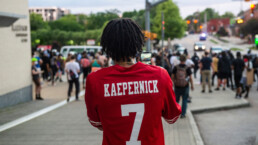A conversation with Colin Kaepernick on Black studies, white supremacy, and capitalism.
by Indigo Olivier, The New Republic
While the teaching of Black history has long been a topic of controversy in the United States, over the past few years conservative forces have coalesced to remove books in public schools and libraries from Black and LGBTQ authors at an alarming rate. This assault has come into sharp focus in Florida, where Governor Ron DeSantis’s 2022 Stop WOKE Act has banned the teaching of “critical race theory” in public schools and the state’s recent rejection of the new A.P. African American Studies course prompted the College Board to strip the curriculum of controversial material.
Conservatives present critical race theory as an oppressive ideology intended to make white students feel guilty about slavery and racism while liberal coverage has often framed these attacks as a “culture war” being led by high-profile figures and reactionary parents. Often lost in the coverage of GOP attacks are the ideas and voices behind the educational materials being banned.

A new anthology, Our History Has Always Been Contraband: In Defense of Black Studies, co-edited by Colin Kaepernick, Robin D.G. Kelley, and Keeanga-Yamahtta Taylor, makes the case that Black Studies is a crucial tool in fighting back against a white supremacist political agenda. The anthology presents an interdisciplinary body of work that touches on feminist theory, queer studies, abolition, reparations, education, history, and more. The book includes essays from Kaepernick, Taylor, and Kelley, as well as W.E.B. Du Bois, James Baldwin, Angela Davis, Octavia Butler, bell hooks, Barbara Smith, Kimberlé Williams Crenshaw, Huey Newton, and Bobby Seale.
Recent Posts
‘Unconstitutional. Unethical. Authoritarian.’ ICE Bars Millions Of Immigrants From Bond Hearings
July 18, 2025
Take Action Now One watchdog said the new policy “seems like a blatant attempt to stop them from exercising their right to due process.”……
Americans Are Not Nearly Alarmed Enough About Climate Change
July 18, 2025
Take Action Now Americans still don’t comprehend how imminent, dangerous, and far-reaching the threat is—and journalists are partly to blame.By…
The IRS Is Building A Vast System To Share Millions Of Taxpayers’ Data With ICE
July 17, 2025
Take Action Now ProPublica has obtained the blueprint for the Trump administration’s unprecedented plan to turn over IRS records to Homeland Security…
Israel’s Sudden Assault On Syria Is Unchecked Aggression
July 17, 2025
Take Action Now Jerusalem is bombing Damascus and threatening al-Sharaa’s rule, while Washington was hoping to help the nascent government on…




